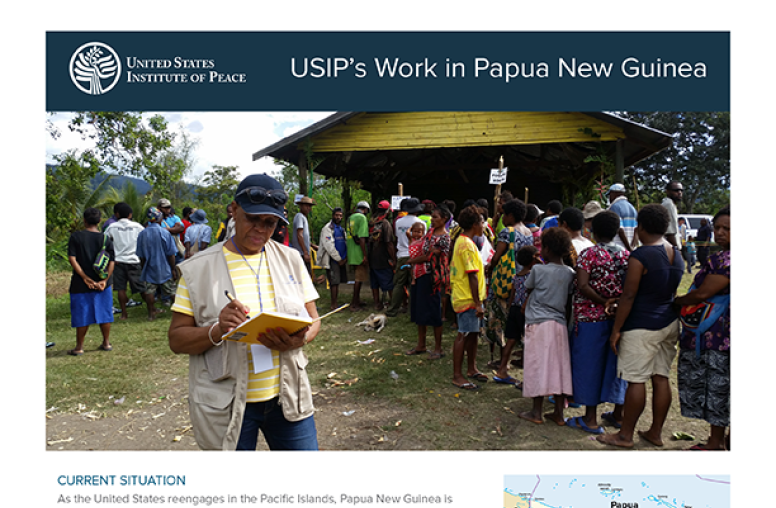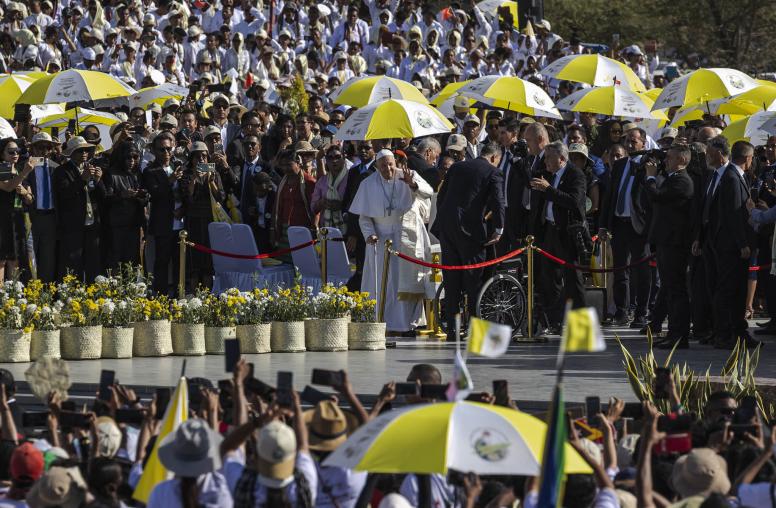Bougainville Seeks U.S. Support Amid Strategic Rivalry in the Pacific
President Ishmael Toroama wants Bougainville to be independent from Papua New Guinea by 2027.
“In 2019, our people voted — we believe in democracy,” Ishmael Toroama, president of the Autonomous Region of Bougainville, said in a speech at Georgetown University in Washington on November 9. Toroama was referring to the 2019 referendum in which 97.7 percent of Bougainvilleans, with 87.4 percent turnout, voted for independence from Papua New Guinea in a powerful confirmation of their long-held desire for self-determination. This desire has been largely ignored by the world, but in order to realize it, Bougainville needs strong international partners.

Toroama came to Washington at a time of heightened interest in the Pacific. The United States’ regional strategy is now over a year old, and the past year has been marked by new embassy openings, funding announcements and high-level visits. Underlying these efforts are U.S. concerns about China’s interests in the Pacific, including the signing of an unprecedented security pact with Solomon Islands in 2022 that could grant Beijing military access to the strategic World War II battleground. Bougainville, itself a strategic location during the war, borders Solomon Islands to the north.
As Bougainville seeks to break away from Papua New Guinea — and to acquire funding that can sustain its statehood — it, too, could increasingly become a site for geostrategic rivalry. Toroama came to Washington to deliver a message of friendship and partnership. It is now up to Washington to determine how to answer. While the United States must balance its relationship with Bougainville with its ties to Papua New Guinea, Bougainville’s independence aspirations and desire for engagement from Washington cannot be ignored any longer.
Bougainville Is Reaching a Crossroads
Bougainville, which is made up of one large island and several outlying islands and atolls, has sought independence since long before Papua New Guinea’s own independence from Australia in 1975. In the 1960s, the colonial administration forced the native people to labor for Australia’s mining operations on Bougainville’s main island. Low wages and abusive treatment led to the formation of a pan-Bougainvillean identity and a desire to control their own natural resources — especially Panguna mine, the largest open-cut copper mine in the world, which is worth about $60 billion. Bougainville declared independence two weeks before Papua New Guinea’s independence from Australia but received no recognition from the international community.
“The colonial administration saw that mine would bankroll Papua New Guinea’s independence, and that’s what happened,” Toroama said in his speech. After 1975, resources from Panguna came to account for 45 percent of Papua New Guinea’s exports and funded its new statehood. Meanwhile, Bougainvilleans received little of this wealth, Toroama said, instead suffering massive environmental degradation from the mine. “No attention was paid to Panguna landowners, so we organized ourselves.”
Toroama joined the Bougainville Revolutionary Army at age 19. Starting in 1988, conflict over Panguna led to a bloody decade-long civil war between Bougainville and Papua New Guinea, as well as within Bougainville itself, in which as many as 20,000 people — or 10 percent of Bougainville’s population — lost their lives. Bougainville declared independence amid the war, again without international recognition. Toroama became a general in the Bougainville Revolutionary Army and then a peacemaker in the process that culminated in a 2001 peace agreement. He also played a key role in the post-conflict weapons disposal process. The peace agreement required that Bougainville hold an independence referendum before 2020 but gave Papua New Guinea’s National Parliament the final say on the region’s political future. After coming second in Bougainville’s 2015 presidential election, Toroama was elected in 2020, with independence his highest priority.
For Toroama, who has fought for Bougainville’s independence his whole life, the end is in sight. He took up the presidency, he said, to ensure that democracy and the will of the people would prevail. In his words, Bougainville has “reached the point of no return,” with the government planning to achieve independence between 2025 and 2027. But the referendum requires ratification from Papua New Guinea to take effect, and negotiations have progressed slowly. “It’s a political issue we have with Papua New Guinea,” Toroama said. “Prime Minister James Marape is my personal friend, but the people’s aspiration is Bougainville should be independent.” There is about one year left for Toroama to resolve the impasse with Port Moresby before the 2025-2027 window arrives and Bougainvilleans’ expectations rise further. If talks are difficult now, they will only be harder in 2025.
Toroama said he is frequently asked if Bougainville’s independence will be economically viable, a question he answers with an emphatic “yes.” He noted in his speech that Panguna helped bankroll Papua New Guinea’s independence, and he is confident that it could also bankroll Bougainville’s independence. However, the mine has been closed since the civil war, and would need to become fully operational again. In addition to Panguna, the Bougainville government could earn additional revenue from fisheries: Papua New Guinea’s catch in Bougainville’s waters is about 30 percent of the national total. Nevertheless, it seems clear that if Bougainville is to become independent, it will need foreign support and recognition — and that impetus led Toroama to Washington.
How Will the United States Respond?
Toroama visited Washington to garner support for his aspiring nation, the first such trip by a president of Bougainville. “Coming here is about getting the attention of the U.S., if that attention could be captured,” he said. He pointed to the historical ties between the United States and Bougainville, and the Allied bases that used to exist there. This month marks the 80th anniversary of the U.S. Marine Corps’ landing at Cape Torokina. The U.S. presence in Bougainville during World War II created positive feelings toward the United States for decades afterward — and those positive feelings persist to this day but cannot be taken for granted.
Toroama emphasized repeatedly during his speech that Bougainville wants to be a friend to the United States, noting shared values of democracy and freedom. He outlined multiple ways the United States could partner with Bougainville, including in the removal of unexploded ordnance from World War II and the provision of aid and investment. A USIP team visiting Bougainville this year witnessed firsthand the region’s many challenges, from the crumbling infrastructure and high risk of natural disasters to the lack of electricity and government capacity. Bougainville’s low-lying atolls are also particularly vulnerable to the effects of climate change.
It seemed clear from his speech that Toroama prefers the United States over China, but a successor — the next presidential election occurs in 2025 — may not share that view. “When I stood for president,” Toroama said, “I didn’t stand for China,” setting him apart from political rivals who allegedly accepted Chinese funding. After 2025, any one of these political rivals could move Bougainville closer to Beijing, suggesting the United States has a small window of opportunity to engage with a more receptive government now.
Could something like the China-Solomon Islands security agreement happen in Bougainville if it were an independent nation? Toroama said that Solomon Islands, despite its geographical proximity, is a very different place. Nonetheless, his statements about Chinese funding in the 2020 election underscore the risk of elite capture.
Against the backdrop of U.S.-China strategic rivalry, 2025 is fast approaching, but Bougainville and Papua New Guinea seemingly have no way to resolve their opposing aims. It is in the United States’ best interest to maintain good relations with and between both parties. Washington may choose to remain neutral on Bougainville’s political future to avoid alienating Port Moresby, but more U.S. engagement in Bougainville — not less — will probably help to establish the U.S. government as a trusted partner which can play a productive role in a crisis. As USIP wrote earlier this year, there are many ways for the United States to forge a stronger partnership with Bougainville.
Regardless of how China and the United States choose to respond, Bougainville is moving. When asked what he will do if Papua New Guinea says no to independence, Toroama answered: “I don’t have a backup plan. The people voted for independence. We will just move forward. I think I made myself clear that I will be moving Bougainville forward.”



